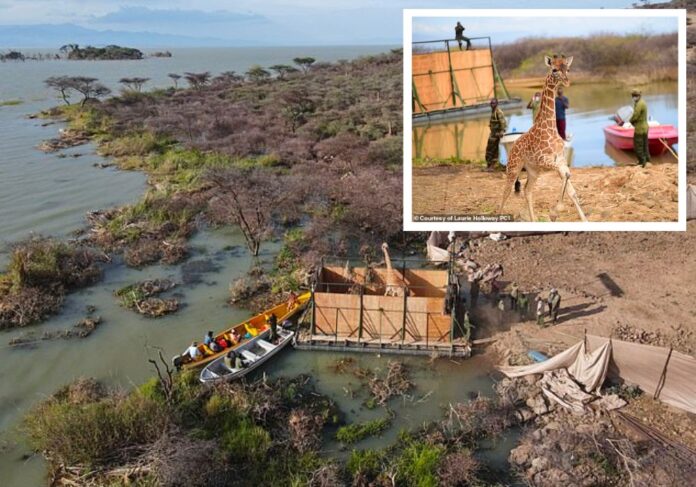Wildlife conservationists worked against the clock to save nine endangered giraffes stranded on a flooded Kenyan island. Their efforts have finally paid off, with the last two being taken to shore.
A young calf called Noelle and her mother, Ngarikoni were hoisted onto the same steel barge that transported the other seven to the Roku Conservancy over Lake Baringo.
The herd crossed what was formerly a peninsula to forage, but days of heavy rain shut them off from the mainland, imprisoning them on Longicharo Island.
Ngarikoni gave birth to Noelle while on the island, and they were the last to be saved owing to the special care required to transport such a young giraffe.
‘Relief and excitement radiated from the rescue team when tiny Noelle calmly stepped off the custom-built barge and onto dry land, followed by her mother, signaling the successful finish of this ambitious rescue,’ the rescuers said in a statement.

The intensive 15-month initiative was a collaboration between the Ruko Community Conservancy, the Northern Rangelands Trust, and the Kenya Wildlife Service, as well as the Dallas-based Save Giraffes Now and locals.
‘We felt a real sense of urgency to execute this rescue,’ said David O’Connor, president of Save Giraffes Now, which works on over 20 giraffe conservation programs in nine African countries.
‘With giraffes facing a quiet extinction, every one we can save counts, making this rescue a critical step in ensuring the future of this species.’
The first daring rescue occurred in December 2020, when a highly endangered Nubian giraffe named Asiwa was rescued.


Two young females, Susan and Pasaka, were saved a few weeks later. This year, the four surviving adult females, Ngarikoni, Nalangu, Awala, and Nasieku, and one adult male, Lbarnnoti, were relocated.
The area has been afflicted by heavy rain, which caused Lake Baringo, which surrounds the peninsula, to rise to six inches daily.
Ruko rangers delivered food to the stranded animals, but with increasing water, a long-term solution was required.
Working with the other teams, the rangers attempted to accustom each animal to the barge by leaving delicacies like as pellets, acacia leaves, seed pods, and mangos on board in the hopes that the giraffes would walk inside voluntarily and easily complete the journey.


The giraffe-proof steel barge, called ‘GiRaft,’ floats atop six empty drums and is strengthened on all sides to prevent it from escaping.
A tiny motorboat towed the enormous raft down the river to the refuge.
‘This ground-breaking project not only saved these giraffes, but it also marks their reintroduction to the mainland for the first time in 70 years,’ added O’Connor.
‘For both of those reasons, this rescue is a huge success.’
The animals are Rothschild’s, or Nubian, giraffes, a critically endangered subspecies of Northern giraffes that used to traverse the whole western Rift Valley in Kenya and Uganda.


‘Each giraffe has its own personality,’ said Susan Myers, founder and CEO of Save Giraffes Now.
‘Some are really timid, while others are fearless and gladly board the barge. This is a time-consuming procedure, and the staff is taking its time with the training.’
Fewer than 3,000 remain in Africa, with only approximately 800 in Kenya.
‘These giraffe are the heart of our motherland,’ said Mike Parkei, a ranger at Ruko Conservancy.
‘We felt we needed to band together and do everything we could to save them.’
Related Posts:
Two baby elephants are rescued after falling into a muddy waterhole in Zimbabwe
Don’t peck his nose and eat it: Buffalo seems not to mind as oxpeckers eat from its NOSTRILS
Buffalo is saved by its friends while being EATEN by lions which are sent flying through the air
